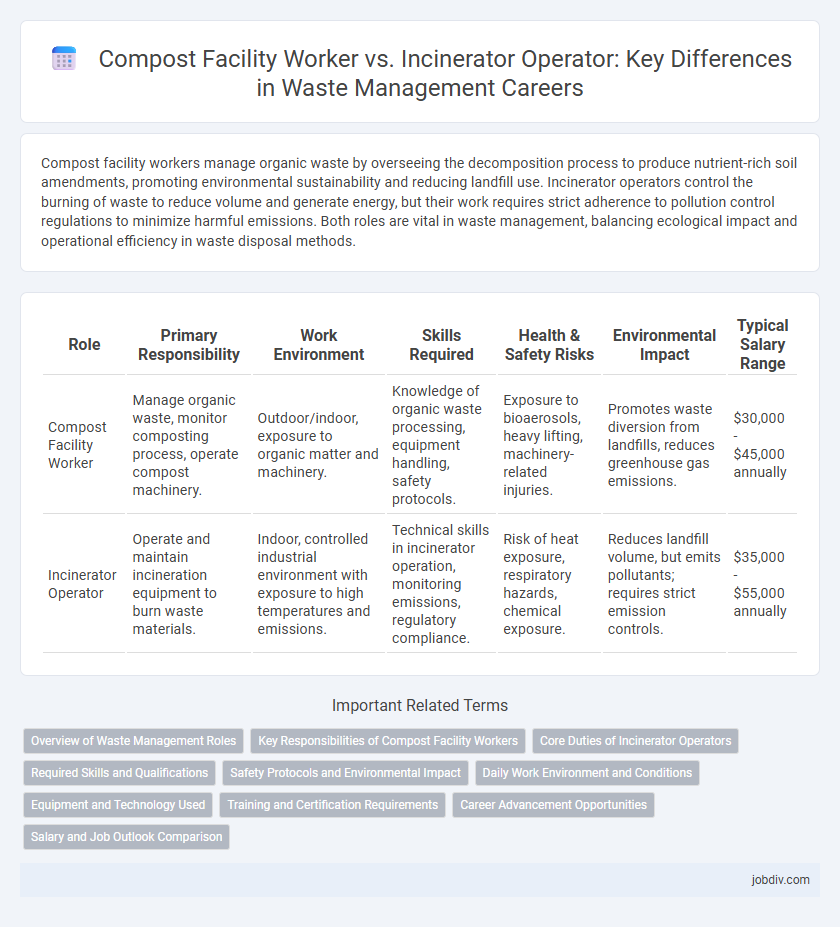Compost facility workers manage organic waste by overseeing the decomposition process to produce nutrient-rich soil amendments, promoting environmental sustainability and reducing landfill use. Incinerator operators control the burning of waste to reduce volume and generate energy, but their work requires strict adherence to pollution control regulations to minimize harmful emissions. Both roles are vital in waste management, balancing ecological impact and operational efficiency in waste disposal methods.
Table of Comparison
| Role | Primary Responsibility | Work Environment | Skills Required | Health & Safety Risks | Environmental Impact | Typical Salary Range |
|---|---|---|---|---|---|---|
| Compost Facility Worker | Manage organic waste, monitor composting process, operate compost machinery. | Outdoor/indoor, exposure to organic matter and machinery. | Knowledge of organic waste processing, equipment handling, safety protocols. | Exposure to bioaerosols, heavy lifting, machinery-related injuries. | Promotes waste diversion from landfills, reduces greenhouse gas emissions. | $30,000 - $45,000 annually |
| Incinerator Operator | Operate and maintain incineration equipment to burn waste materials. | Indoor, controlled industrial environment with exposure to high temperatures and emissions. | Technical skills in incinerator operation, monitoring emissions, regulatory compliance. | Risk of heat exposure, respiratory hazards, chemical exposure. | Reduces landfill volume, but emits pollutants; requires strict emission controls. | $35,000 - $55,000 annually |
Overview of Waste Management Roles
Compost Facility Workers manage organic waste by overseeing the decomposition process to produce nutrient-rich soil amendments, emphasizing sustainability and reducing landfill use. Incinerator Operators control the combustion of non-recyclable waste, converting it into energy while ensuring emissions meet environmental standards. Both roles are critical in integrated waste management systems, balancing environmental impact with effective waste reduction strategies.
Key Responsibilities of Compost Facility Workers
Compost facility workers manage organic waste by sorting, grinding, and monitoring composting processes to ensure efficient biodegradation and nutrient-rich soil production. They regularly inspect equipment, maintain site cleanliness, and adhere to environmental regulations to minimize contamination and odors. Their key responsibilities also include testing compost quality and managing organic material flow to optimize decomposition and support sustainable waste management.
Core Duties of Incinerator Operators
Incinerator Operators manage the combustion process to reduce waste volume, ensuring facilities operate safely and comply with environmental regulations. They monitor equipment performance, control temperature and emissions, and maintain records of waste types and quantities processed. Their core duties include troubleshooting operational issues, conducting routine maintenance, and coordinating with environmental agencies to minimize pollution.
Required Skills and Qualifications
Compost facility workers require knowledge of organic waste breakdown, soil science, and machinery operation, with a high school diploma often sufficient along with on-the-job training. Incinerator operators need specialized skills in combustion technology, emissions control, and boiler operation, typically requiring certification and technical education. Both roles demand attention to safety protocols and environmental regulations to manage waste effectively.
Safety Protocols and Environmental Impact
Compost facility workers follow safety protocols that emphasize protective gear to handle organic waste and prevent exposure to pathogens, while incinerator operators prioritize monitoring emission controls to minimize inhalation of toxic fumes. Composting reduces landfill waste and lowers greenhouse gas emissions through natural decomposition, contrasting with incineration which generates energy but releases pollutants like dioxins and heavy metals. Both roles require strict adherence to environmental regulations to limit occupational hazards and decrease overall environmental impact effectively.
Daily Work Environment and Conditions
Compost facility workers operate in open-air environments, often exposed to organic odors, moisture, and variable weather conditions while manually sorting and managing biodegradable materials. Incinerator operators work indoors near high-temperature furnaces, monitoring combustion processes and ensuring emissions compliance under strict safety protocols to manage heat and toxic gases. Both roles require physical stamina and adherence to environmental regulations, but compost workers face more outdoor elements, whereas incinerator operators manage controlled but hazardous chemical exposure.
Equipment and Technology Used
Compost facility workers primarily utilize equipment such as shredders, aerators, and temperature monitoring systems to manage organic waste decomposition efficiently. Incinerator operators rely on advanced combustion chambers, air pollution control devices like scrubbers, and automated feed systems to burn waste safely and reduce emissions. Both roles demand proficiency with specialized technology to optimize waste processing and environmental compliance.
Training and Certification Requirements
Compost facility workers typically require certification in compost management and training in organic waste handling, focusing on environmental safety and soil science principles. Incinerator operators must obtain specific licenses, often including hazardous waste handling certification and technical training on combustion systems and emissions control. Both roles demand compliance with local environmental regulations and ongoing professional development to ensure safe and efficient waste processing.
Career Advancement Opportunities
Compost facility workers typically experience career advancement through roles such as facility supervisors, environmental technicians, or waste management coordinators, leveraging expertise in organic waste processing and sustainability practices. Incinerator operators can advance to senior operator positions, plant supervisors, or environmental compliance specialists, focusing on combustion technology and emission control systems. Both career paths offer growth in environmental management, but compost facility roles increasingly align with green job opportunities amid rising demand for sustainable waste solutions.
Salary and Job Outlook Comparison
Compost facility workers earn an average annual salary of $30,000 to $45,000, with job growth projected at 8% over the next decade due to increased demand for sustainable waste management. Incinerator operators typically receive higher compensation, ranging from $45,000 to $60,000 per year, supported by steady job prospects driven by waste-to-energy initiatives, with employment growth around 5%. Both roles contribute to waste reduction efforts, but compost facility positions offer stronger growth potential aligned with environmental sustainability trends.
Compost Facility Worker vs Incinerator Operator Infographic

 jobdiv.com
jobdiv.com